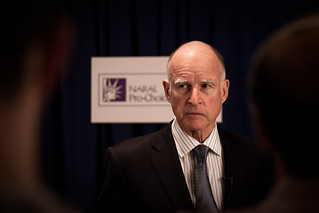Former self-proclaimed vigilante joins “Free California” movement in attempt to recall Pomona senator
by Brian Leubitz
Sure, I could have posted the video from the Bee of Donnelly talking about the recall campaign. But, let’s face it, this is about Tim Donnelly, so the ColbertReport video was far more appropriate. The former MinuteMan state leader is pretending to run for Governor next year, and even Abel Maldonado is getting more and better press coverage.
So, he needs some sort of stunt, kind of like the fence stunt in the video. And attempting to recall a State Senator that has been in office for about six months seems to fit the bill:
Having failed to persuade Gov. Jerry Brown to reject a wide-ranging package of gun control bills, pro-gun advocates announced on Thursday they will seek to punish Democrats who supported the measures at the ballot box.
“Every single assemblyman and state senator swore an oath to uphold and defend the Constitution,” Assemblyman Tim Donnelly, R-Twin Peaks, told reporters before speaking at the conference. “And when they violate that oath by trying to erase the Second Amendment, then I think we have a duty” to “remove that threat.”(SacBee)
This is of course from a man who claims to be a vigilante and carried a gun into the airport. Torres seems to be merely a name he chose from a list of Democrats, perhaps one with a slightly less Democratic seat. But the underlying fact is that Torres won the special election this spring, and deserves to server out her term.
Californians support these very modest gun safety changes, and Torres seems to be in little actual threat. But this is about Tim Donnelly, the “patriot not politician”, who apparently loves to play political games.






